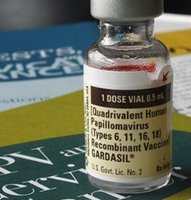Merck pressing for OK to market Gardasil for males

Newark, NJ
After more than two years of selling the Gardasil vaccine as a way of protecting girls and young women against cervical cancer, Merck is asking federal drug regulators to allow the vaccine's use in boys and men between the ages of 9 and 26.
The drugmaker is counting on the expanded use to boost sales of Gardasil, which have flattened after a quick start. Getting that boost, however, may prove difficult.
Advertisement
After two years on the market, Gardasil's side effects have made some pediatricians more reluctant to recommend it for their youngest patients. And despite the vaccine's early, soaring revenue -- it reached sales of $1.4 billion in its first year -- Merck has yet to capture a huge share of its primary market: young women, including college students.
The vaccine could be an even harder sell for boys.
One of the big reasons to vaccinate males is to stop the spread of the human papillomavirus, a sexually transmitted disease often referred to simply as HPV. But that may not prove as compelling a sales pitch as one that touts a vaccine as a protection against cancer.
"Boys don't get cervical cancer," said C. Anthony Butler, an analyst with Barclays Capital in New York City, "so parents could be reluctant to provide them with the vaccine.
"We want better health, but we don't want to do what's required to get it," Butler said. "It's a Catch-22."
Merck submitted an application to federal drug regulators last month requesting approval to begin selling Gardasil to boys as a protection against HPV-caused genital lesions. The U.S. Food and Drug Administration is expected to decide later this year whether Merck's application meets its standards.
Gardasil was originally approved by the FDA in 2006 as a vaccine to protect girls and young women against four strains of HPV -- known as 6, 11, 16 and 18. Health officials have blamed the latter two strains for causing an estimated 10,000 new cases of cervical cancer each year.
Yet from the beginning, the vaccine proved to be controversial, partly because of the sexual nature of the virus and partly because of Merck's focus on girls as young as 9. Compounding matters was the company's aggressive lobbying efforts to get state governments to include Gardasil as part of mandatory school-immunization programs.
Labels: Cervical Cancer Prevention, Gardasil

0 Comments:
Post a Comment
<< Home